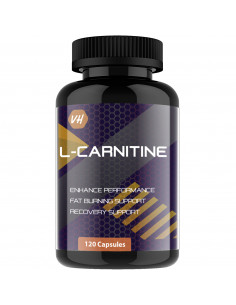- Supplement
- 1 likes
- 2134 views
L-carnitine is a naturally occurring amino acid that plays a crucial role in energy metabolism. It helps transport fatty acids into the mitochondria, where they can be used as fuel for energy production. In addition to its role in fat metabolism, L-carnitine has been shown to have several energy-boosting benefits that can help you power through your day. In this article, we will explore the various ways in which L-carnitine can improve your energy levels and help you perform at your best.
1. Increases Energy Production in Cells
L-carnitine plays a key role in energy metabolism by facilitating the transport of fatty acids into the mitochondria, where they can be oxidized and used as fuel for energy production. Research has shown that L-carnitine can help increase the production of adenosine triphosphate (ATP), which is the primary source of energy for the body's cells. By increasing ATP production, L-carnitine can help improve your energy levels and reduce feelings of fatigue.
2. Enhances Endurance and Athletic Performance
L-carnitine has been shown to have performance-enhancing effects in athletes and individuals engaged in high-intensity exercise. Studies have found that supplementing with L-carnitine can help increase endurance and reduce fatigue during exercise. In addition, L-carnitine has been shown to improve muscle recovery and reduce muscle damage after intense exercise. These effects make L-carnitine a popular supplement among athletes and fitness enthusiasts.
3. Improves Brain Function and Mental Clarity
L-carnitine has been shown to have cognitive-enhancing effects, including improved brain function and mental clarity. Research has found that L-carnitine can help improve memory and attention, as well as reduce mental fatigue and brain fog. These effects are thought to be due to L-carnitine's ability to increase the production of acetylcholine, a neurotransmitter that plays a key role in cognitive function.
4. Reduces Fatigue and Boosts Energy Levels in Chronic Fatigue Syndrome
Chronic fatigue syndrome (CFS) is a debilitating condition characterized by extreme fatigue and exhaustion that is not relieved by rest. Research has shown that L-carnitine can help improve symptoms of CFS by reducing fatigue and boosting energy levels. In a study of 30 individuals with CFS, supplementation with L-carnitine for 8 weeks resulted in significant improvements in energy levels and overall well-being.
5. Supports Weight Loss and Metabolism
L-carnitine has been shown to have fat-burning effects and can help support weight loss and metabolism. Studies have found that supplementing with L-carnitine can increase fat oxidation and reduce fat mass, especially when combined with exercise. In addition, L-carnitine has been shown to improve insulin sensitivity and glucose metabolism, which can help regulate blood sugar levels and prevent insulin resistance.
6. Improves Cardiovascular Health
L-carnitine has been shown to have several cardiovascular benefits, including reducing blood pressure and improving lipid profiles. Research has found that supplementing with L-carnitine can help reduce systolic and diastolic blood pressure, as well as improve lipid profiles by reducing total cholesterol and triglycerides. These effects make L-carnitine a valuable supplement for improving overall cardiovascular health.
In conclusion, L-carnitine is a versatile supplement with several energy-boosting benefits. It can help increase energy production in cells, enhance endurance and athletic performance, improve brain function and mental clarity, reduce fatigue in chronic fatigue syndrome, support weight loss and metabolism, and improve cardiovascular health. While L-carnitine is generally considered safe and well-tolerated, it is always advisable to consult with a healthcare professional first.
References :-
- Stephens FB, et al. Skeletal muscle carnitine loading increases energy expenditure, modulates fuel metabolism gene networks and prevents body fat accumulation in humans. J Physiol. 2013; 591(Pt 18):4655-66.
- Ho JY, et al. L-carnitine supplementation combined with aerobic training does not promote weight loss in moderately obese women. Int J Sport Nutr Exerc Metab.
- Brass EP. Supplemental carnitine and exercise. Am J Clin Nutr. 2000;72(2 Suppl):618S-623S. doi: 10.1093/ajcn/72.2.618S. PMID: 10919967.
- Fielding R, Riede L, Lugo JP, Bellamine A. l-Carnitine Supplementation in Recovery after Exercise. Nutrients. 2018;10(3):349. Published 2018 Mar 13. doi: 10.3390/nu10030349. PMID: 29533983; PMCID: PMC5872767.
- Gögenur I, Kücükakin B, Panduro Jensen L, Reiter RJ, Rosenberg J. Melatonin reduces cardiac morbidity and markers of myocardial ischemia after elective abdominal aortic aneurism repair: a randomized, placebo-controlled, clinical trial. J Pineal Res. 2014;57(1):10-15. doi: 10.1111/jpi.12137. Epub 2014 May 8. PMID: 24813261.
- Harris RC, Söderlund K, Hultman E. Elevation of creatine in resting and exercised muscle of normal subjects by creatine supplementation. Clin Sci (Lond). 1992;83(3):367-374. doi: 10.1042/cs0830367. PMID: 1327657.
- LaNoue KF, Schoolwerth AC. Metabolism and function of amino acids in mitochondria. In: Meister A, ed. Advances in Enzymology and Related Areas of Molecular Biology. Vol 60. Wiley; 1987:91-119. doi: 10.1002/9780470122920.ch4.
- Long J, Zhang M, Xu X, et al. l-Carnitine Supplementation to Diet: A New Tool in Treatment of Nonalcoholic Steatohepatitis--A Randomized and Controlled Clinical Trial. Nutrients. 2016;8(10):701. Published 2016 Oct 28. doi: 10.3390/nu8100701. PMID: 27792179; PMCID: PMC5084026.
- Malaguarnera M, Gargante MP, Cristaldi E, et al. Acetyl-L-carnitine treatment in minimal hepatic encephalopathy. Dig Dis Sci. 2008;53(11):3018-3025. doi:
- 1007/s10620-007-0181-1. Epub 2008 Feb 27. PMID: 18307079. 10. Pauly DF, Pepine CJ. The role of carnitine in myocardial dysfunction. Am J Kidney Dis. 2003;41(4 Suppl 4):S35-S43. doi: 10.1016/s0272-6386(03)00022-3. PMID: 12612986.
- Rebouche CJ. Carnitine. In: Modern Nutrition in Health and Disease. 9th ed. Lippincott Williams & Wilkins; 1999:505-512.
- Sahlin K. Muscle carnitine metabolism during incremental dynamic exercise in humans. Acta Physiol Scand. 1990;139(3):259-261. doi: 10.1111/j.1748-1716.1990.tb08858.x. PMID: 2246139.









